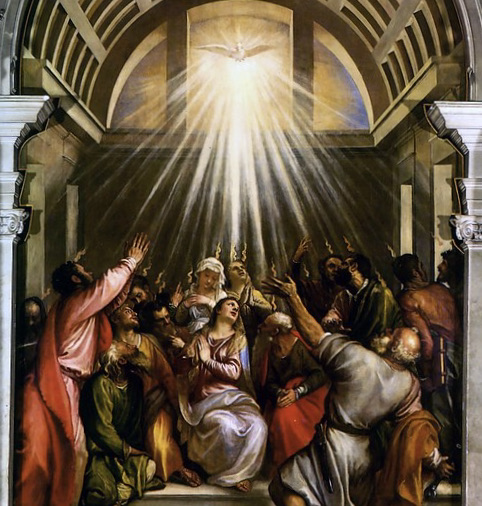
Image: Pentecost, Titian [public domain]
During these last weeks of the semester, our fourth year Biblical School students have been reading and studying Revelation. Amidst the prophecies of judgment and visions of beasts, horsemen, killer locusts, and warrior angels, some of the most beautiful and memorable passages of the book offer us a glimpse of the heavenly throne room where angels and saints offer unceasing worship to the Blessed Trinity: the Father seated upon his throne (4:2), the Son, appearing to John as “a Lamb standing, as though it had been slain” (5:6), and the Holy Spirit: “before the throne burn seven torches of fire, which are the seven spirits of God” (4:5).
The Father on his throne and the Lamb of God are familiar enough images, but why is the Holy Spirit described as seven rather than one? It is because the Spirit is “the Gift that contains all gifts” (CCC 1082).
In Revelation John sees the Holy Spirit in terms of his seven gifts: wisdom, understanding, counsel, fortitude, knowledge, piety, and fear of the Lord. The list of these gifts comes from a prophecy in Isaiah 11:2, which describes the fullness of the Spirit of the Lord resting on the Messiah in terms of these seven gifts (the Hebrew text of Isaiah 11:2—and thus most modern translations—lists fear of the Lord twice at the end, but the Septuagint distinguishes between piety and fear of the Lord, which is why the traditional enumeration is seven gifts).
We find the fullness and perfection of these gifts in Christ, but each one of us receives all seven of these gifts in Baptism and each of us is strengthened in and sealed with these gifts in the Sacrament of Confirmation. We need to call upon them and grow in them, but the gifts are already there as a ladder—beginning with fear of the Lord and climbing up to wisdom—to lead us to union with God himself.
The Catechism tells us that the gifts of the Holy Spirit “are permanent dispositions which make man docile in following the promptings of the Holy Spirit… They complete and perfect the virtues of those who receive them” (CCC 1830-1831). We call upon and grow in these gifts as we practice the virtues, and in turn these gifts perfect the virtues and produce the fruits of the Spirit in our lives: charity, joy, peace, patience, kindness, goodness, generosity, gentleness, faithfulness, modesty, self-control, chastity (see CCC 1832 and Galatians 5:22-23).
Saint Bonaventure correlates the seven gifts of the Holy Spirit with the seven virtues (four cardinal and three theological; see CCC 1804-1805 and 1812-1813, and St. Bonaventure’s Breviloquium vol. XIV, Collations on the Seven Gifts of the Holy Spirit):
- Fear of the Lord—not being scared, but rather reverence for God and an ardent desire not to separate ourselves from Him through sin—perfects the virtue of temperance. Temperance “provides balance in the use of created goods” (CCC 1809), and through the gift of fear of the Lord we live out that balance out of a love and desire for the Creator over any created good.
- Piety—loving and worshiping God as our Father and loving and serving one another out of love for God—perfects the virtue of justice, the “constant and firm will to give their due to God and neighbor” (CCC 1807).
- Knowledge—knowing with certainty that what the Church teaches is true, and how to act accordingly—perfects the virtue of prudence, or “right reason in action” (CCC 1806, quoting St. Thomas Aquinas). With the gift of knowledge we are able to not only judge rightly in earthly matters but also in matters of faith.
- Fortitude, conveniently enough, perfects the virtue of fortitude. As a virtue, fortitude “ensures firmness in difficulties and constancy in the pursuit of the good” (CCC 1808). By the Holy Spirit’s gift of fortitude we are able to not only firmly pursue the good, but actually achieve our ultimate good of eternal life and have a certain confidence in that final victory such that we overcome all fears.
- Counsel—knowing the right thing to do and the right way to do it, in matters pertaining to our salvation–perfects the theological virtue of hope. By hope we desire heaven above all else and trust in Christ’s promise to bring us there (see CCC 1817), and by the gift of counsel we know what we should do to “work out [our] own salvation with fear and trembling” as St. Paul instructs us in Philippians 2:12.
- Understanding—an ability to know God beyond our own natural capacity—perfects faith, “by which we believe in God and believe all that he has said and revealed to us” (CCC 1814).
- Wisdom—the highest gift, by which we are able to see everything from God’s perspective—perfects the greatest virtue, charity, making us truly able to “love God above all things for his own sake, and our neighbor as ourselves for the love of God” (CCC 1822).
By these seven gifts of the Holy Spirit we are radically changed: “As fire transforms into itself everything it touches, so the Holy Spirit transforms into the divine life whatever is subjected to his power” (CCC 1127). Just as the disciples were transformed when the Holy Spirit descended upon them as tongues of fire at Pentecost, so we too are “clothed with power from on high” in Confirmation, which is “the special outpouring of the Holy Spirit as once granted to the apostles on the day of Pentecost” (CCC 1302). This Pentecost, let us embrace the gifts of the Holy Spirit anew. The seven torches which burn before the throne of God in heaven burn also in our hearts. Let us not quench the Spirit (1 Thessalonians 5:19), but rather, as St. Ignatius of Loyola exhorts, “Go, set the world on fire!”


Thank you Ashley.